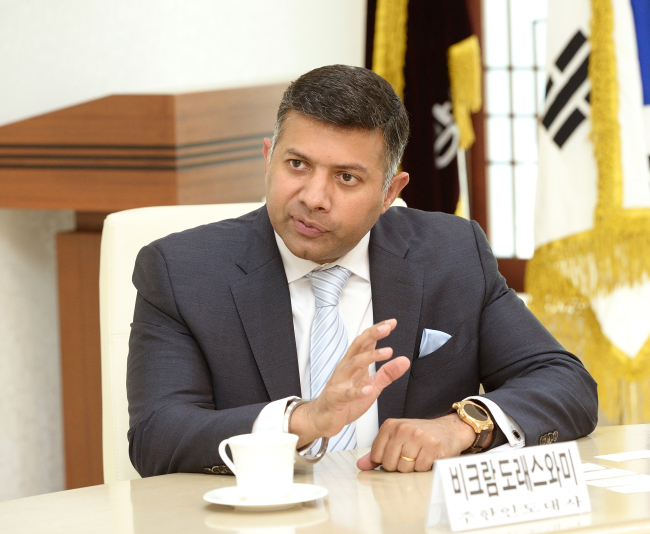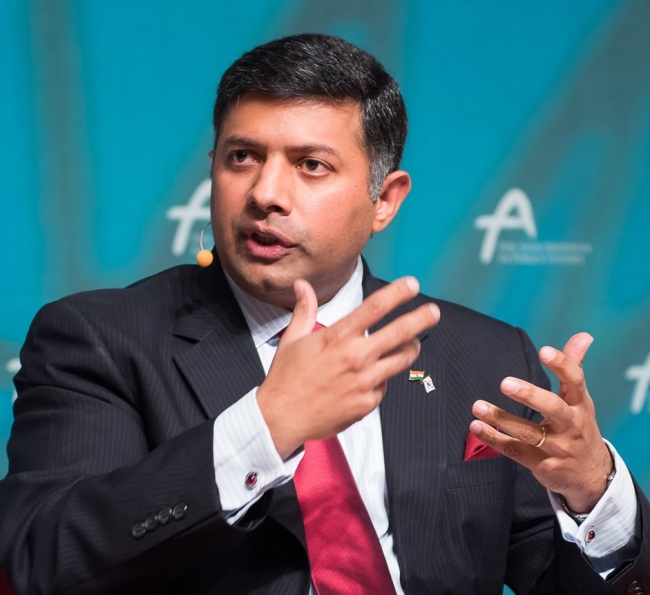With the anticipated visit of South Korean President Moon Jae-in to India this year, New Delhi looks forward to stronger pragmatic engagement with Seoul, harnessing synergies in their mutual pivots across the Indo-Pacific region, according to India’s top envoy to Korea.
Similar to Korea, which has announced its “New Southern Policy” aimed at strengthening ties with Southeast Asian and South Asian countries, India has its “Act East Policy,” which builds on the previous “Look East Policy,” with a greater emphasis on implementing policies of comprehensive cooperation.
“As Korea expands its diplomatic footprints beyond its immediate region, we have long believed that India and Korea are bound to be natural partners,” said Indian Ambassador to Korea Vikram Doraiswami in an exclusive interview.
“It is only natural that India and Korea — democracies with similar values, aspirations and capacities — strengthen their ties on the political, defense, economic, cultural and people-to-people fronts.”
While the exact date of Moon’s visit has yet to be announced formally, the prospective summit will be the pinnacle of both governments’ cooperative endeavors, laying the ground for further collaborations across corporate entities, civil societies and academic institutions, he added. Prime Minister Narendra Modi, India’s 16th premier since 2014, paid an official visit to Korea in May 2015 at the beginning of Doraiswami’s tenure.
 |
| Indian Ambassador to Korea Vikram Doraiswami (Indian Embassy in Korea) |
“India has significantly expanded its ties with all its eastern neighbors, including China, Japan and Korea, as well as the 10 members of the Association of Southeast Asian Nations, Australia and New Zealand,” according to the journalist-turned-diplomat.
“Our leadership is closely engaged with their counterparts in these countries, with the aim of invigorating political, strategic, economic and cultural bonds that anchor India and its eastern horizons closely together.”
Building on Modi’s visit to Seoul, nearly all of India’s senior ministers have visited Korea over the last 3 1/2 years. They include the ministers of external affairs; finance; defense; commerce and industry; road transport, highways, water resources and shipping; railways; science and technology; information technology and electronics; and human resources development.
The bilateral trade in 2017 grew by 30 percent on both sides from the previous year, reversing a negative trend that had started in 2011, according to Korean official statistics cited by the Indian Embassy in Seoul. Investment flows have gained momentum, with Korean firms having plowed nearly $3.5 billion in the last three years into India’s automobiles and auto components, electronics, chemicals, technical textiles, food processing, finance and other industries.
The two countries are currently in the final stage of negotiation to upgrade the Comprehensive Economic Cooperation Agreement — a bilateral free trade agreement that entered into force in 2010 — with an aim to improve the competitiveness of each side’s goods and services in their markets, and spur synergies in information technology and electronics, energy and shipbuilding, according to the diplomatic mission.
The agreement has facilitated the opening of both economies’ services market. On the Indian side, telecommunications, construction, distribution, transportation, accounting, real estate, health care and other sectors have opened, while on the Korean side, consulting, education, engineering and computer science have been liberalized.
Defense ties in particular have grown from strength to strength, with a major defense partnership deal worth nearly $1 billion signed last year for the joint production of Korean self-propelled artillery guns and India’s purchase of these weapons. Five Indian Navy vessels have sailed to Korea over the past three years, extending the blood-sealed partnership that stretches back to the 1950-53 Korean War.
The two governments signed the Strategic Partnership Agreement in defense production in March last year, identifying areas of further cooperation.
“Our goal is to be able to find synergies between areas of India’s strengths and Korea’s needs, and vice versa. Shipbuilding is one such area in which Korean firms could look at India’s naval roll-out strategically, as a means of ensuring standing business orders for future decades,” noted the ambassador.
“Our bright young military officers are also studying at each other’s military academic and related institutions for the first time on an institutionalized basis of exchange annually. They will recognize the opportunities and potentials our India-Korea partnership offers.”
 |
| Indian Ambassador to Korea Vikram Doraiswami (Indian Embassy in Korea) |
Doraiswami said India is keen to buttress its partnerships with countries across the Indo-Pacific region: a concept describing the evolving geopolitical and economic order surrounding the Indian Ocean’s tropical waters, the western and central Pacific Ocean and the Southeast Asian seas.
He countered the prevailing view that the Indo-Pacific concept, or strategy, largely promoted by Washington, Canberra, Tokyo and New Dehli, is designed to curb the influence of Beijing, which has brandished its vision of global integration through the “One Belt, One Road” initiative. China’s ambitious global project comprises the overland Silk Road Economic Belt and oceanic Maritime Silk Road projects.
“Prime Minister Modi has stated that the purpose of engagement across the Indo-Pacific should be to promote cooperation, not dominance; connectivity, not isolation; respect for the global commons; inclusive, rather than exclusive, architectures; and adherence to international rules and norms,” the diplomat said.
“Therefore our focus is on the development of an open, transparent and inclusive architecture linking the Indian and Pacific oceans. We desire to work with all stakeholders whose prosperity and security depend on the waterways traversing these two major oceans.”
Noting that while India is not as trade-dependent an economy as East Asian ones, including Korea, Doraiswami stressed that his country was vitally interested in the security and stability of the region, as well as securing access to maritime “highways” in the Indian Ocean and the surrounding seas, through which the majority of the world’s energy resources and trade flow.
“In addition to strengthening our maritime industry in the oceans economy, we are rapidly expanding our naval and coast guard capabilities that include aircraft carrier groups, submarines and aircrafts,” he said. “Our security needs require an extensive scaling-up of our existing platforms. Some $35 billion worth of equipment is currently on our navy’s shopping list for procurement over the next decade and beyond.”
The ambassador encouraged Korean shipyards and their tier-one companies, which have faced industrywide financial difficulties in recent years, to create partnerships with India’s maritime enterprises. The Indian market can not only sustain their businesses, but also create jobs on both sides, he said.
By Joel Lee (joel@heraldcorp.com)

